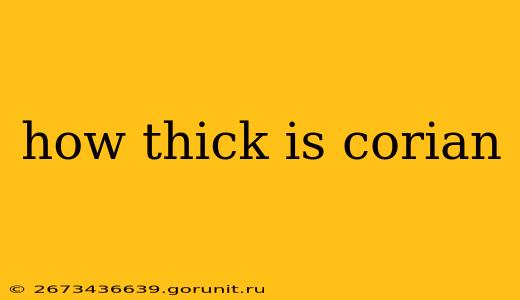How Thick is Corian? A Comprehensive Guide to Corian Thicknesses and Applications
Corian, the iconic solid surface material, is known for its versatility and elegant appearance. But one common question homeowners and designers alike have is: how thick is Corian? The answer, as you'll see, isn't a single number. Corian comes in a variety of thicknesses, each suited for different applications and design preferences. Understanding these variations is crucial for making informed decisions about your project.
Standard Corian Thicknesses
While the exact offerings might vary slightly depending on region and availability, Corian generally comes in these standard thicknesses:
-
12mm (½ inch): This is a popular choice for many applications, offering a good balance between durability and cost-effectiveness. It's often used for countertops, vanity tops, and other horizontal surfaces where moderate thickness is sufficient.
-
19mm (¾ inch): This thicker option provides enhanced durability and a more substantial feel. It's frequently selected for larger countertops, kitchen islands, and applications where added strength is desired. This thickness is also a great choice for applications that require more structural support.
-
Other Thicknesses: While less common, you may find Corian available in other thicknesses, possibly custom-ordered for specialized projects. Always confirm the thickness with your supplier before purchasing.
Factors Affecting Corian Thickness Selection
The ideal Corian thickness depends on several factors:
-
Intended Use: A countertop in a high-traffic kitchen might benefit from the added strength of a 19mm slab, whereas a bathroom vanity might suffice with 12mm.
-
Cabinetry Support: Adequate cabinet support is essential regardless of the Corian thickness chosen. A poorly supported countertop, even a thick one, can still crack or sag.
-
Aesthetic Preferences: Some designers prefer the sleeker look of a thinner Corian surface, while others appreciate the more substantial feel of a thicker slab.
-
Edge Profile: The chosen edge profile can also subtly affect the perceived thickness of the Corian.
Beyond Thickness: Other Corian Considerations
While thickness is important, several other factors influence the suitability of Corian for a particular project:
-
Color and Pattern: Corian offers a wide range of colors and patterns to complement any design style.
-
Seamlessness: One of Corian's key advantages is its ability to be seamlessly joined, creating a virtually invisible seam between pieces.
-
Durability and Maintenance: Corian is relatively easy to maintain and clean, making it a practical choice for busy homes. However, it's important to be aware of potential scratches and stains.
-
Cost: The cost of Corian varies based on thickness, color, and the size of the project.
Conclusion
Choosing the right Corian thickness is a crucial step in ensuring a successful project. By understanding the available thicknesses and the factors influencing the selection process, you can make an informed decision that meets both your aesthetic and functional needs. Remember to always consult with a qualified fabricator to determine the best Corian thickness for your specific project and to ensure proper installation.

